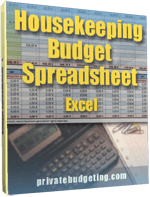What is a 'budget' or 'budgeting'?
A "budget" is a summary or an estimation of the money you earn (income) and the money you spend (expenses) over a given period of time. Or put another way, a budget is a certain amount of money or resources intended for a particular reason, such as an activity or a time-frame. "Budgeting" or "to budget" means to manage your budget in a way that helps you to achieve your goals (given that money is a factor).
1. Clearing up some misconceptions about budgeting
The mere mention of the word "budget", let alone contemplating to do some budgeting oneself, can be intimidating for some people, conjuring up images of accounting offices of large corporations or the serious look of a debt advice service employee who is about to tell you that you have to live a life of deprivation from now on. Some might associate budgeting with being flat broke or with having to pinch pennies and muddle through life; however, budgeting is not just for people who can't make ends meet or are undergoing a major transition. Budgeting can be done by everyone, no matter if wealthy, poor, young or old. In fact, keeping your cool in financially tense times will be easier when you have been budgeting before and are familiar with the procedure.2. Budgeting - not just a fancy word
Budgeting is not just a fancy word for a company's strategy to manage its capital, cash flow, income, and expenses. People have managed their finances before computers and digital budget spreadsheets came on the scene using traditional budgeting systems, such as pen & paper or the envelope system. The word budget is derived from the old French meaning "leather pouch, small bag or sack"; in the 18th century a connection with finance was made. Since then, a budget also means the content of a "pouch" or "purse".Before the expression "budget" got popular, people might just as well have used the term "spending plan", which basically means the same thing. No matter what you call it, it can be your path to greater financial freedom; many households or individuals incorporate, consiously or intuitively, some sort of strategy to balance their budget.
Click here to learn more about what you can do to stay on top of your finances and to keep your budget healthy.3. What does budgeting do?
Budgeting involves compiling and re-evaluating your income and expenses on a regular basis and balancing the monye you spend on things with te money you actually have at your disposal. Budgeting allows you to forecast how much money you will have for the things you need and whether there will be enough money left for the things you want. A budget accomplishes two things:- A budget reveals the different sources where your money comes from and where it goes. It allows you to make informed and strategic choices about your expenses and savings. This can be a real eye-opener and help you to see the bigger picture.
- Based on the first step, a budget enables you to strategically redirect your money flow to respond to needs as they arise.
A budget is not something set in stone. It is your individual plan for managing your money based on choices you make and priorities that you identify for yourself. Creating a spending plan, or budget, is a step–by–step process that involves tweaking the way you spend your money. Once set up, your budget is the solid foundation that enables you to manage your income and expenses to better plan for future possibilities.
Ultimately, the goal of budgeting is to get to that point where your income exceeds your expenses: If your income is greater than your expenses, you'll have money left over to save or spend, with a clear conscience, rather than spending more money and piling up more debts.
